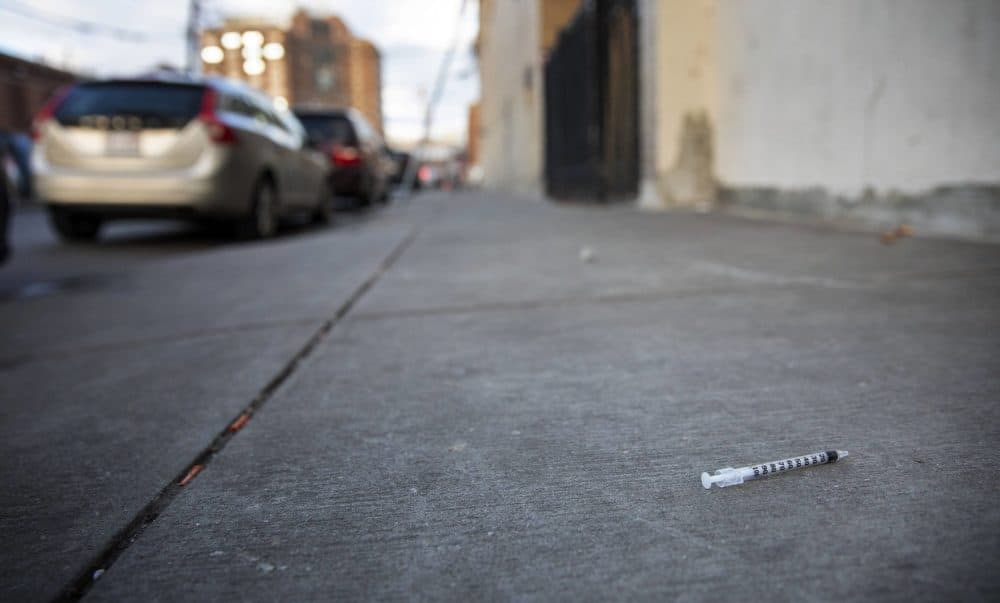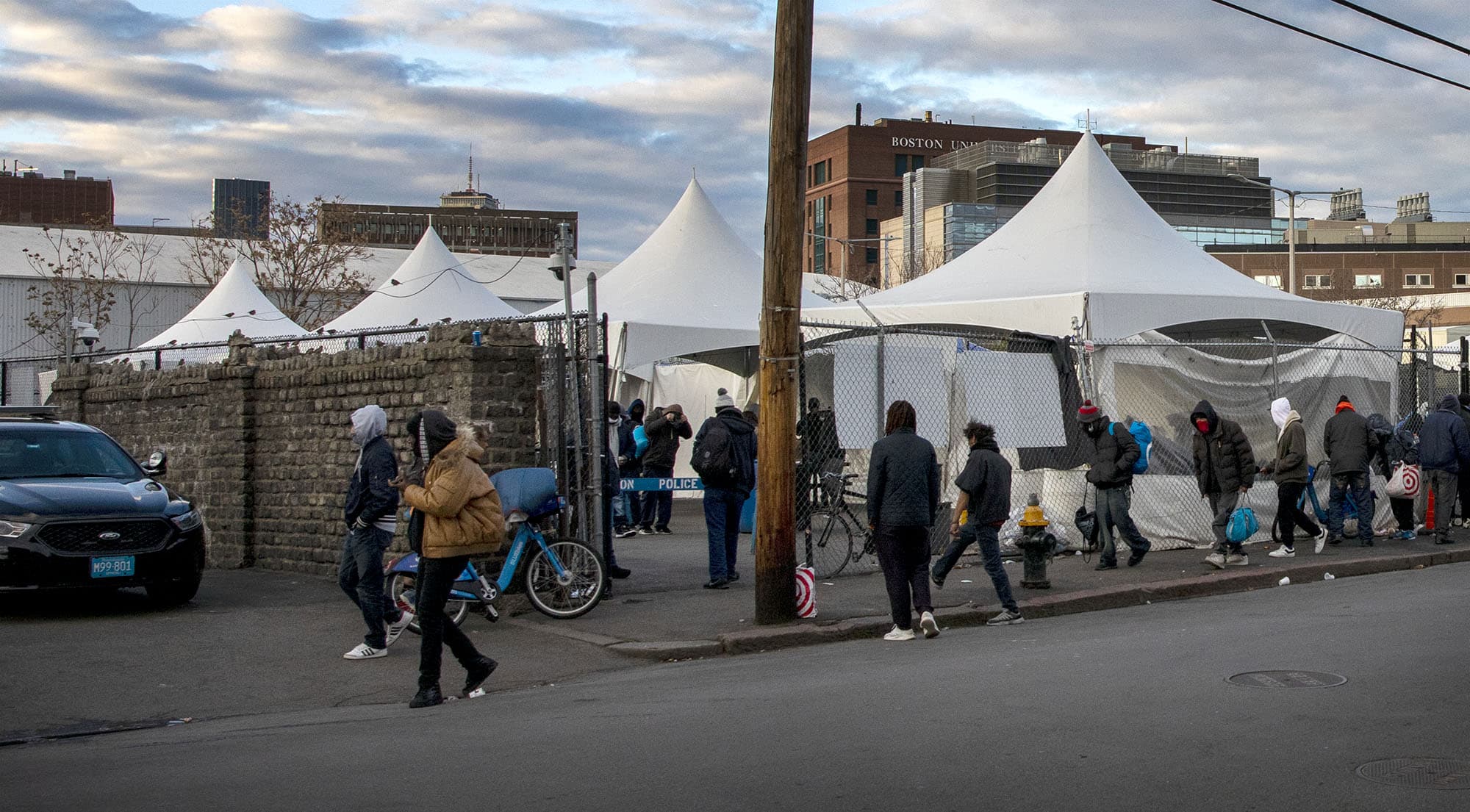Advertisement
Coronavirus Coverage
Focus Remains On Troubled Boston Area Amid Concerns The Pandemic Is Worsening The Opioid Crisis

State data released Wednesday show a 2% increase in opioid related overdoses in Massachusetts for the first nine months of this year. The numbers are the first to bear out what many advocates have feared for months now: that the opioid epidemic may be worsening amid the coronavirus pandemic.
A visible epicenter of the state's opioid epidemic is in Boston — at the intersection of Massachusetts Avenue and Melnea Cass Boulevard, an area commonly called "Mass/Cass." The area is home to several social service and medical facilities including Boston Medical Center, addiction treatment centers, methadone clinics and homeless shelters that provide services to thousands of Massachusetts' most vulnerable residents. Like many other things, the coronavirus pandemic has amplified some of the neighborhood's challenges.
When the coronavirus pandemic first hit Massachusetts, Boston health officials scrambled to set up what they called "comfort stations" — fenced in areas staffed by medical and outreach workers where people could go to access services - and public bathrooms — especially with many drug treatment and other service programs and businesses shut down.

On a recent visit to the comfort station on Atkinson Street, hundreds of people were gathered in an area surrounded by a chain link fence covered with black mesh. Under temporary tents, outdoor tables and chairs were set up, along with portable toilets and hand sanitizing stations. Many people were openly using drugs or appeared to be under the influence of drugs.
Some residents have complained about the comfort station, but advocates said it's filling a critical need.
"Believe it or not there's quite a community inside, you'll find a lot of people taking care of each other," said Jessie Gaeta, with Boston Health Care for the Homeless Program, one of the agencies that helps staff the comfort station. "We help provide people with their medications and access services. Is this the most dignified way to live? No, but it's better than not having access to bathrooms at all, not having access to water and soap."
The Boston Public Health Commission, which oversees the site, estimates that it serves 200 people a day. Aside from hygiene needs, the commission said it also reverses up to four overdoses daily and provides addiction medications, masks and coronavirus testing. Many of the people who use the site describe it as literally a life-saver.
Advertisement
Without places like this, you know, a lot of us would be probably dead.
Louis Malik Cardamon Blancs
"A lot of people, they drive by, they walk in, they see like, oh, everybody's just getting high. And they don't see the bigger picture. Without places like this, you know, a lot of us would be probably dead," said 28-year-old Louis Malik Cardamon Blancs, who jokingly calls himself the mayor of the comfort station because he's there so frequently and often helps clean up when it closes at 4:30 p.m.
"It has helped me. I would say it saved my life three times," said Calderon Blancs. "For a person like me, I don't know how to help myself, you know, but I know how to help other people, and I'm always giving a lending hand. But, like, I actually honestly don't know how to fix me."
Many neighbors want the city to fix the comfort station. The increasing number of people congregating in the Mass/Cass area was the focus of a lengthy Boston City Council meeting this week. South End Resident Anyssa Buchanan was among about a dozen residents who expressed concerns that the city's efforts are not helping the people who frequent the site.
"How are these individuals supposed to seek treatment and actual recovery when they're subjected to sitting at a tent in the middle of an open air drug market?" Buchanan said. "This is the equivalent of scheduling an [Alcoholics Anonymous] meeting in the middle of a bar."
Residents also complained about discarded needles, trash and human waste that have become common on city streets and in neighborhood parks. Marla Murphy Smith, who said she lives within a mile of Mass/Cass, wants the area to be designated a public health emergency.
"There are insane numbers of discarded needles everywhere, so to avoid being stabbed I no longer walk in the park without leather boots," Smith said. "Most upsetting of all, our children are seeing things like users injecting drugs in plain sight, public urination, sex acts and violence. It must be acknowledged that what is harm reduction for one population is unequivocally harm creation for another."
The Boston Public Health Commission said steps have been taken to deal with several issues. It said city crews are now cleaning the area three times a day, and the city is helping clean private properties as well. The Commission's Devin Larkin said the work isn't all that different from what was being done pre-pandemic, it's just that now it's being done in a different, more visible place.
"So right now, we're providing almost all of our services outside, and that looks very different than it did before COVID," Larkin said. "So all of our harm reduction services are outside (...) because it's the safest place for us to provide services for our clients and our staff. And so we needed a mechanism to be able to do that."
"... our children are seeing things like users injecting drugs in plain sight, public urination, sex acts and violence. It must be acknowledged that what is harm reduction for one population is unequivocally harm creation for another."
Marla Murphy Smith
Mayor Marty Walsh has been trying to improve the Mass/Cass area for years. His latest effort released last October — a plan called Mass/Cass 2.0 — called for more police and outreach workers.
Walsh administration officials told city councilors this week that encampments where unhoused people set up tents or areas to sleep on city streets will be removed and police presence will be further increased. The Boston Police Department plans to move its Street Outreach Office into the Mass/Cass neighborhood, and the city said police officers are working with homeless services providers to identify people who need housing.
City officials said in the past year, there have been 1,494 encounters between police outreach officers and people on the streets in the Mass/Cass neighborhood, as well as 131 civil commitments for mental health treatment, 124 voluntary commitments to addiction treatment and 64 involuntary commitments to substance use treatment.
In August, Boston police were roundly criticized for the way officers cleared Atkinson Street and made several arrests. Although police said they were addressing violent crime in the area, advocates said the police action, dubbed "Operation Clean Sweep," was too harsh, removing residents experiencing homelessness and throwing away their belongings.
At this week's public meeting, some residents questioned whether the city is relying too much on police to deal with complex social and health problems.
"This new Mass/Cass plan is just a continuation of 'Operation Clean Sweep' with a different name," said homeless advocate Cassie Hurd "The plan is not rooted in evidence-based solutions. It's rooted in the criminalization and coercion of people and engaging the police as public health workers, which is — that is not what they're trained to do."
This is a huge challenge, and there is no singular answer. There's no simple thing.
Marty Martinez
Marty Martinez, chief of the city's Health and Human Services Office, said plans for the area are being revised, and right now the focus is on preparing for the upcoming winter and working with the state to move some services out of Boston.
Longer term, he said the city is still pursuing the idea of a recovery campus on Long Island. The goal, Martinez said, is to balance public health, public safety and quality of life issues as the city deals with a continuing opioid epidemic and the current viral pandemic.
"This is a huge challenge and there is no singular answer," Martinez said. "There's no simple thing. Anyone who tells you that doesn't understand the complexity of the issues. The ability to keep people alive has been one of the key things that we've been focused on, that you can't get people on the path to recovery and making decisions that will help their lives if you can't keep them alive."
This segment aired on November 19, 2020.
